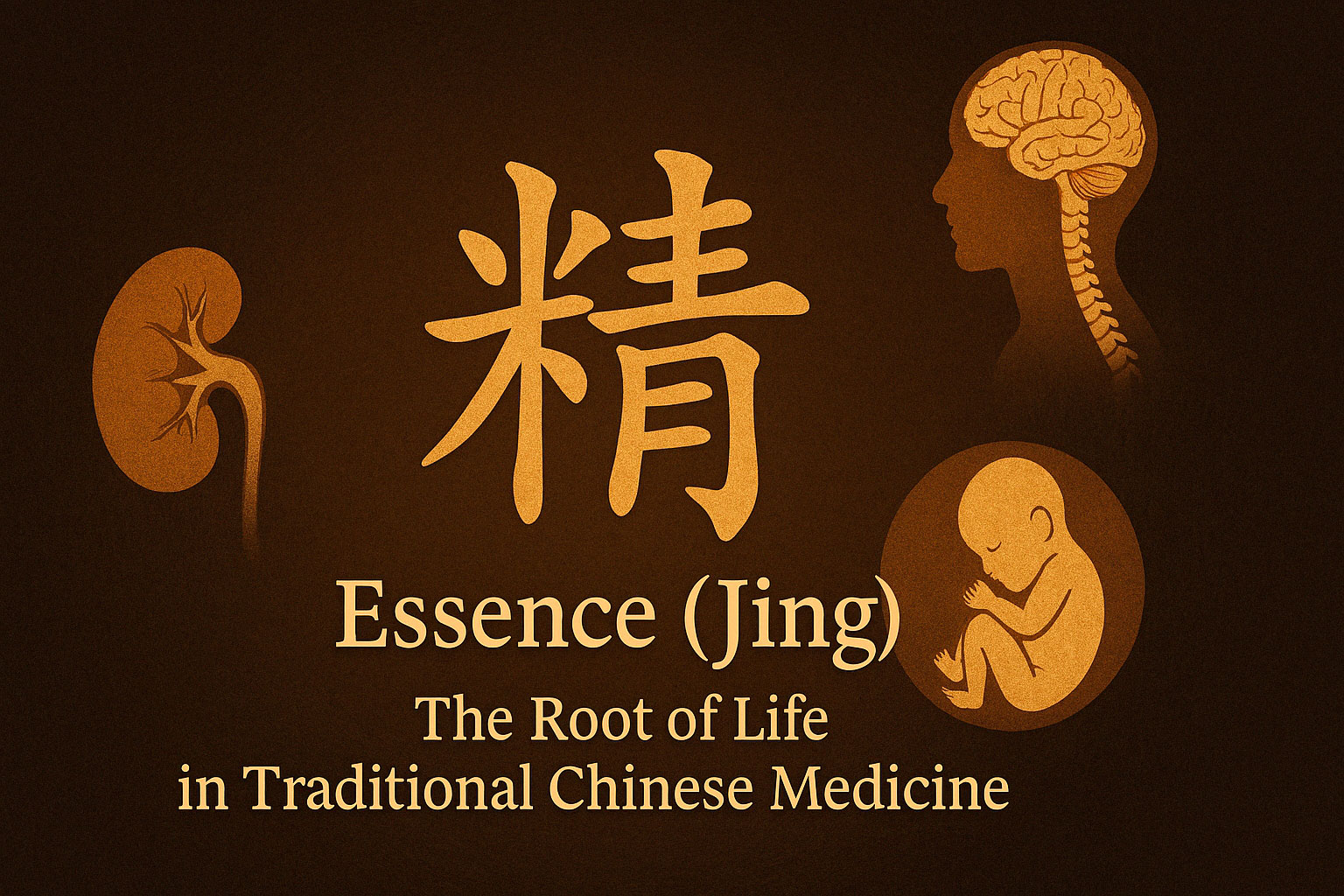In Traditional Chinese Medicine (TCM), Essence (Jing, 精) is considered the most fundamental and precious substance of the human body. It is the root of life, the source of growth and development, and the foundation of reproduction and longevity.
While Qi governs function and activity, Jing provides the deep reservoir of vitality upon which the entire life process depends. In this article, we will explore the nature of Jing, its sources, functions, and how to protect it in daily life.
🔶 What Is Jing?
In Chinese, “精” means essence, refined substance, or purity. In TCM, Jing refers to a concentrated, foundational life substance with both material and energetic aspects.
Jing exists in two main forms:
| Type | Description |
|---|---|
| Prenatal Jing (先天之精) | Inherited from parents at conception; determines constitutional strength, fertility, and longevity |
| Postnatal Jing (后天之精) | Derived from food, drink, air; produced through the function of the Spleen and Kidneys |
Together, these two types of Jing support growth, development, and resilience.
🔶 Functions of Jing in the Human Body
- Growth and Development
- Jing governs physical development from embryo to old age
- Deficient Jing may cause developmental delays or premature aging
- Reproduction
- Jing forms the basis of fertility in both men and women
- In men, Jing is closely related to sperm; in women, it supports menstrual and reproductive function
- Basis of Qi and Blood
- Jing is transformed into Qi and Blood — it supports the production of vital substances
- Determines Constitutional Strength
- People with abundant Jing tend to have strong bones, teeth, hair, and vitality
- Supports the Brain and Marrow
- Jing nourishes the Kidneys, spinal cord, brain, and is associated with memory and concentration
- Known as “the sea of marrow” in classical theory
🔶 Jing, Qi, and Shen: The Three Treasures (三宝)
TCM describes life as being sustained by the Three Treasures:
| Treasure | Role |
|---|---|
| Jing (Essence) | The foundation of the body, like the roots of a tree |
| Qi (Energy) | Functional vitality, like the movement of sap |
| Shen (Spirit) | Consciousness and mind, like the blossoms of life |
These three must be balanced and mutually supportive for true health and longevity.
🔶 Jing Deficiency: Signs and Causes
| Causes | Examples |
|---|---|
| Congenital weakness | Low birth weight, developmental delay |
| Chronic illness | Depletes deep reserves |
| Overwork or excessive sex | Taps into Jing reserves, especially Kidney Jing |
| Poor nutrition | Weakens Postnatal Jing production |
🩺 Symptoms of Jing deficiency may include:
- Premature graying or hair loss
- Weak knees and lower back
- Low libido or infertility
- Poor memory and cognitive decline
- Slow growth in children or early aging in adults
🔶 Nourishing and Preserving Jing
Unlike Qi, Jing is precious and not easily replenished. TCM emphasizes preservation over depletion.
✅ Lifestyle Tips:
- Adequate rest and regular sleep (especially before 11 PM)
- Balanced diet with Jing-tonifying foods: black sesame, walnuts, bone broth, goji berries, cooked grains
- Avoid excessive stress, sexual activity, and burnout
- Moderate exercise: Tai Chi, Qigong, walking in nature
✅ Herbs That Support Jing:
- He Shou Wu (Polygonum) – Nourishes Liver and Kidney Jing
- Shu Di Huang (Rehmannia) – Deeply replenishes Blood and Essence
- Gou Qi Zi (Goji berries) – Tonifies Liver and Kidney
- Lu Rong (Deer Antler) – Strengthens Yang and Jing (used cautiously)
🔶 Conclusion
Jing is the root of vitality, fertility, and longevity in TCM. Though largely invisible, its influence can be seen in our development, strength, and ability to resist aging. By protecting Jing through thoughtful living, nourishment, and cultivation of balance, we secure our deepest reserve of health — not just for today, but for decades to come.


发表回复